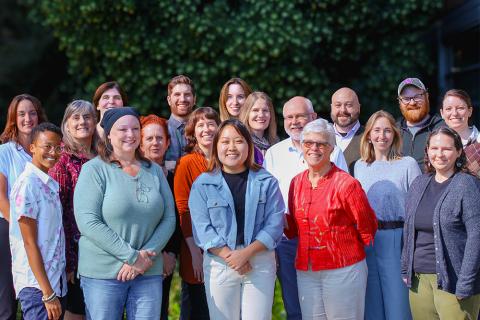
2024 NWCPHP staff photo
As 2024 comes to a close, the Northwest Center for Public Health Practice (NWCPHP) reflects on the current state of public health and the work ahead.
The workforce faces a new, complex reality, and as NWCPHP Director, Betty Bekemeier, acknowledged, “It underscores our need to listen and work to understand one another, now more than ever.”
“Our work is valuable to the entire region and paramount during this time,” Betty added. “We need to approach our work with curiosity. We need to remain effective in what we do so that we may continue to support our practice partners as they directly engage with and meet the needs of their communities.”
NWCPHP is proud of what we accomplished in 2024 in partnership:
- We are deeply involved in supporting public health workforce data collection from the Public Health Workforce Interests and Needs Survey (PH WINS), which will provide more data about the rural public health workforce than we’ve ever had. Rural communities have diverse needs, and our region is heavily rural and frontier.
- The Northwest Center for Evidence-Based Public Health Emergency Preparedness and Response (PHEPR) was launched with funding from the CDC. Led by the UW Center for Disaster Resilient Communities, this is one of several centers nationwide focused on improving the uptake of evidence-based strategies and interventions among state, tribal, local, and territorial public health agencies and their partners. This contract upends the traditional university-based research approach by having practitioners, rather than researchers, determine the priorities for and activities undertaken by the Center.
- We worked on many technical assistance requests from our Public Health Infrastructure Grant (PHIG) grantees. One example was a request to host focus groups and interviews to help better understand how to improve onboarding and retention strategies for staff members of color. Another request was to create and deliver training for local public health staff and community partners to gain skills with rural health data.
- NWCPHP convened attendees from all six of our PHIG grantee organizations in March for a 1.5-day meeting. The participants engaged in networking opportunities, exchanging ideas, and learning more about our offerings through discussions with thought leaders and presentations.
- The Foundational Public Health Services Statewide Assessment/Epidemiology Community of Practice, established by the Washington State Department of Health and developed in partnership with the Washington State Association of Local Public Health Officials and NWCPHP, promotes collaboration, coordination, and training among local, Tribal, and state assessment and epidemiology professionals. In 2024, the program completed its second busy year of facilitated training and mentoring.
- NWCPHP entered its fourth year of partnership with the Washington State Department of Health to advance data modernization efforts. Review the growing body of curated training resources developed from this work.
Programs and Trainings:
- Our monthly Hot Topics in Practice webinar series celebrated 20 years of discussing emerging topics in the field. There were 3,012 live and recorded combined views this year. The hottest topics were navigating misinformation, rural health, and AI in public health.
- The Seven Directions' Indigenous Evaluation Toolkit was developed in partnership with Seven Directions. This training translates Indigenous values and knowledge into a cyclical learning process with actionable steps that teams can work through at their own pace.
- The Washington State Department of Health partnered with NWCPHP to tailor Project Firstline trainings to address ongoing challenges in infection control. This was especially relevant to practitioners in Washington, as many of the first US-based COVID-19 cases appeared in long-term care facilities in the Seattle area.
- 187 scholars from around the region participated in NWCPHP’s cohort programs, including the Northwest Public Health & Primary Care Leadership Institute, Public Health Management Certificate, Essentially Public Health, and Leading with Insight. Check out the many scholar stories on our website to learn about their experiences.
- Essentially Public Health, a new live learning series, was launched to support the training needs of people new to public health or who do not have formal training. We hosted five virtual cohorts and one in-person training at a local public health agency.
- The People of Public Health podcast was developed this year and allows listeners to dive deeper into essential public health work at the local level. Season One explores the opioid epidemic in one county in Washington.
- The Emergency Distribution of Pharmaceuticals training was revised to highlight pharmacy collaborations among low-income communities that have limited access to pharmacies.
- NWCPHP awarded 20 public health students from schools around the region with stipends to support field placements and collaborative projects in public health organizations. The diverse range of project topics included: food security, culturally considerate mental health needs and services, homelessness, LGBTQ+ health, sexual health services, racial disparities in reproductive health services, telehealth policies, and improving tobacco and smoke-free policies. Read their stories.
Evaluation:
- The evaluation team supported 15 training and evaluation grants/contracts.
- Over the four sessions, Essentially Public Health received an average satisfaction rate of 96% and an average of 89% agreed their understanding of the subject matter improved after receiving this training.
- 90% were satisfied or very satisfied with the Leadership Institute overall and 90% said they would apply the skills they learned. 95% the program helped them to meet their leadership development goals.
NWCPHP is committed to “ensuring public health professionals are satisfied in their work and working collaboratively with partners,” Betty concluded. “We must stay on our toes to be responsive and supportive of the public health workforce so they can thrive now and in the year to come.”